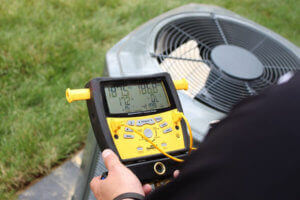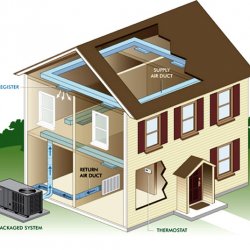
Your St. Louis HVAC system is bound to encounter technical issues as it goes through wear and tear from regular use. While some issues will require you to seek professional help from HVAC experts, like those at Galmiche & Sons, others may just need a few minor tweaks. In this article, we will take you through the most commonly misunderstood HVAC problems. We hope that this HVAC troubleshooting guide helps you to identify trivial issues and sort them out before they become a cause for concern.
For more help with HVAC troubleshooting or to schedule an appointment with our St. Louis heating and air conditioning professionals, contact us online or by phone today.
Troubleshooting Minor HVAC Problems
When it comes to HVAC systems, the most common types found in St. Louis area homes are gas or electric furnaces, air conditioning systems, and heat pumps. Each of these systems has its own share of problems and can pose certain challenges. As such, HVAC troubleshooting can look different depending on the type of system.
Here are some common problems to look out for:
- Gas valves and thermocouple: For consistent heating, your furnace’s gas valves have to remain open. They are reliant on the thermocouple for this. The thermocouple, located beside the pilot, has to stay heated up for the gas valves to stay open. However, if the thermocouple’s temperature dips, there is a chance that the gas valves will close.
- Pilot: A gas furnace cannot generate any heat if its pilot’s flame is not burning. Sometimes, a few strong gusts of wind may be enough to make the pilot’s flame go out.
- Grinding noises: If you hear your furnace generating grinding noises, it is only natural for you to feel concerned. However, most of the time, grinding noises aren’t indicative of any serious technical problem. The noises, in all likelihood, are due to the fan’s lack of lubrication.
- Strange smells: Obnoxious and strange smells are among the most common sources of HVAC troubleshooting headaches. These smells are typically generated by HVAC systems when they are switched on after lying dormant for a long time. More often than not, these smells indicate the burning of dust settled within the HVAC system. However, if you smell gas, this could be a sign of a dangerous gas leak, contact the professionals immediately, and evacuate the premise until help arrives.
- No heating or cooling: Your HVAC system has two primary jobs – to provide cooling during the summers and warmth during the winters. When it fails to do either effectively, you may feel as if there is a major issue. However, in many cases, ineffective heating and/or cooling is a sign of low refrigerant. You should schedule routine maintenance of your HVAC system (at least once a year). The professionals can assess the level of refrigerant and replenish it if necessary.
- Inefficiency: If your St. Louis HVAC system is working, but it is not working as fast as you expect it to, this may have something to do with the system’s thermostat. In such a scenario, it is best to check the thermostat settings and adjust them if needed. However, you should reach out to a professional if the adjustments do not make any difference. The state of the thermostat’s batteries may also be to blame for inefficient heating and/or cooling.
Contact Us for Professional HVAC Troubleshooting & Repair

Minor HVAC troubleshooting is something you can do on your own with some awareness and education. However, if you cannot fix the issue yourself, it is best to get in touch with licensed HVAC repair professionals who can get to the root of the issue and resolve it for good. In St. Louis, contact the experts at Galmiche & Sons to schedule your HVAC troubleshooting and repair appointment today.









